Munich-Giesing station
Munich-Giesing station (German: Bahnhof München-Giesing) is a railway station in the district of Obergiesing in the Bavarian state capital of Munich and is a station of the Munich S-Bahn and the Munich U-Bahn. It is located on the Munich East–Deisenhofen railway, the Munich-Giesing–Kreuzstraße railway, which branches off to the east from the Munich East–Deisenhofen line next to the Perlacher Forst cemetery, and the second trunk line of the Munich U-Bahn. The station is served by about 280 S-Bahn services each day.
Munich-Giesing | |||||||||||||||||||||||||||||||||||
|---|---|---|---|---|---|---|---|---|---|---|---|---|---|---|---|---|---|---|---|---|---|---|---|---|---|---|---|---|---|---|---|---|---|---|---|
| Through station | |||||||||||||||||||||||||||||||||||
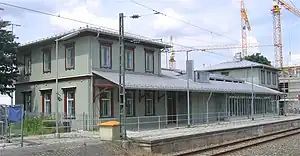 Former station building seen from the tracks (2008) | |||||||||||||||||||||||||||||||||||
| General information | |||||||||||||||||||||||||||||||||||
| Location | Giesinger Bahnhofplatz 1, Giesing, Munich, Bavaria Germany | ||||||||||||||||||||||||||||||||||
| Coordinates | 48°6′37″N 11°35′47″E | ||||||||||||||||||||||||||||||||||
| Line(s) | |||||||||||||||||||||||||||||||||||
| Platforms | 3 | ||||||||||||||||||||||||||||||||||
| Connections | |||||||||||||||||||||||||||||||||||
| Construction | |||||||||||||||||||||||||||||||||||
| Accessible | Yes | ||||||||||||||||||||||||||||||||||
| Other information | |||||||||||||||||||||||||||||||||||
| Station code | 4255[2] | ||||||||||||||||||||||||||||||||||
| DS100 code | MGI[3] | ||||||||||||||||||||||||||||||||||
| IBNR | 8004148 | ||||||||||||||||||||||||||||||||||
| Category | 3[2] | ||||||||||||||||||||||||||||||||||
| Fare zone | |||||||||||||||||||||||||||||||||||
| Website | |||||||||||||||||||||||||||||||||||
| History | |||||||||||||||||||||||||||||||||||
| Opened | 10 October 1898 | ||||||||||||||||||||||||||||||||||
| Services | |||||||||||||||||||||||||||||||||||
| |||||||||||||||||||||||||||||||||||
| Location | |||||||||||||||||||||||||||||||||||
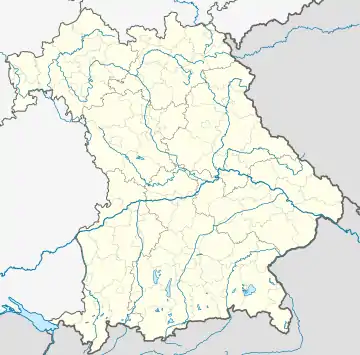 Giesing Location in Bavaria  Giesing Location in Germany 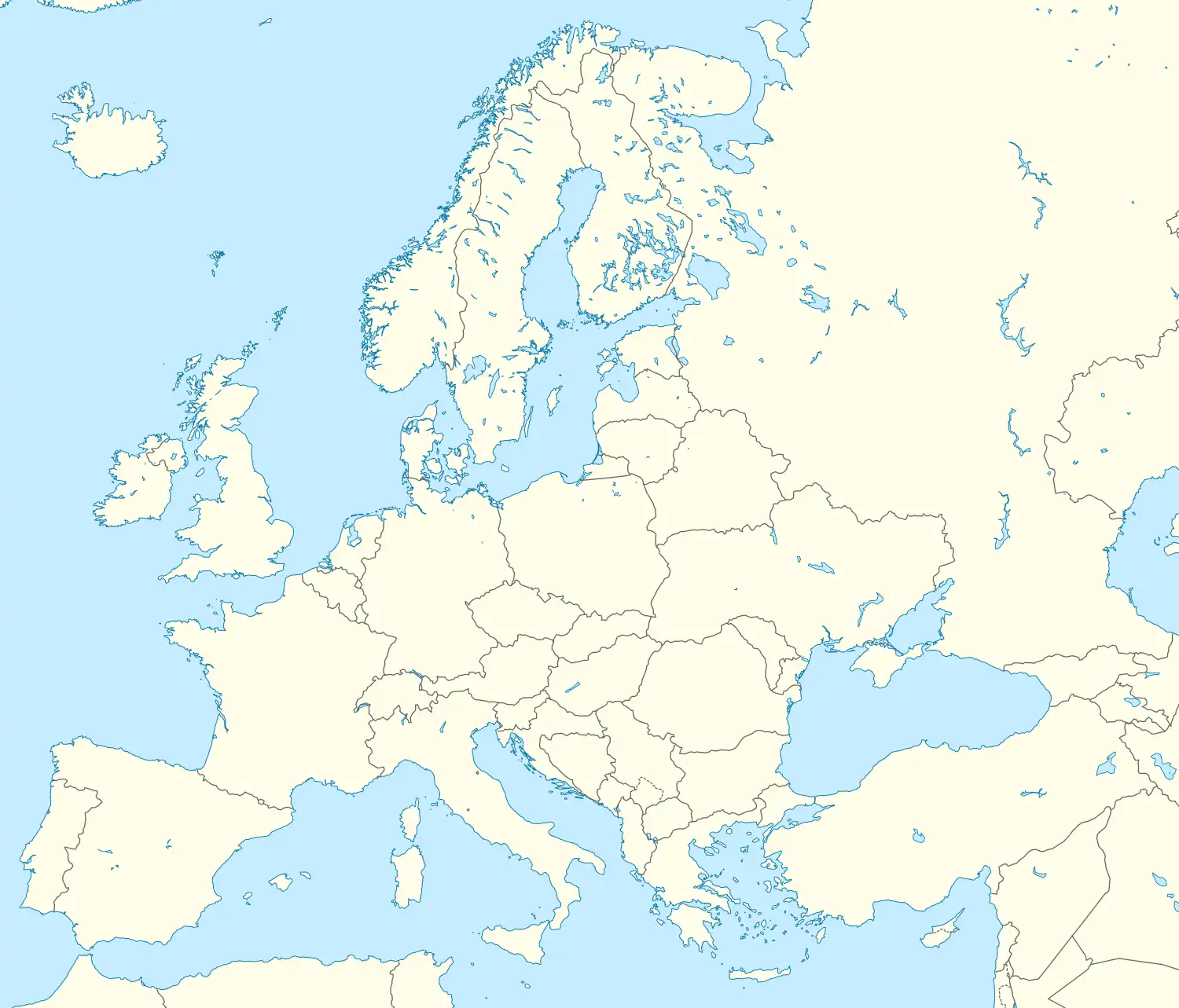 Giesing Location in Europe | |||||||||||||||||||||||||||||||||||
History
The Munich-Giesing station was built in 1898 on the newly built Munich East–Deisenhofen railway. The station was at this time a little more than a kilometre from the settlement of Giesing and was surrounded by meadows and fields. The former municipality of Giesing had already been incorporated in Munich since 1854. In 1904, a line via Perlach to Kreuzstraße was built; this used the existing line from Munich East station via Giesing station to the Perlacher Forst cemetery, where it branched off to the east.
A tram depot was built next to the station in 1912; this was used until 1972, when it was decommissioned and demolished. In the late 1920s and during the Nazi period, Giesing grew so that large blocks of flats were built in the area near the station and in the fields and meadows along Deisenhofener Straße to central Giesing. In addition, the lines were electrified at this time. On 28 May 1972, the station was integrated in the Munich S-Bahn.
In 1985, the station building became one of the last suburban railway stations in Munich to receive monument protection and since 2004 it has been used as a district cultural centre under the name of Giesinger Bahnhof and as the Gleiswirtschaft restaurant. On 18 October 1980, the second main line of the Munich U-Bahn was opened with the Giesing U-Bahn station under the S-Bahn station. The integrated bus terminal in front of the station was redesigned and in the course of the reconstruction was moved temporarily into the street next to the railway line. In mid-2009, a health centre and a retirement home were completed at Giesing station. Since 2010, the bus station has returned to the station forecourt.
Infrastructure
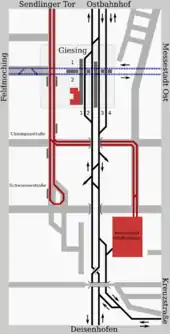
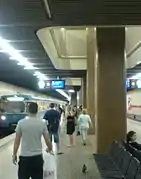 Platform
Platform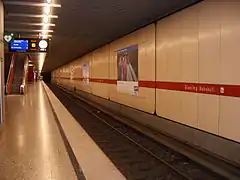 Giesing U-Bahn station
Giesing U-Bahn station
S-Bahn station
The S-Bahn station has four tracks, one of them has no platform and is used by through freight trains and two are used by the S-Bahn. The fourth track, which has a platform, serves as a siding. A special feature of the station is that the line between Munich East station (Ostbahnhof) and the junction at the Perlacher Forst cemetery has traffic running on the left, unlike almost all other Deutsche Bahn lines that run on the right. This is because S-Bahn at Munich East station must reverse, and running on the left avoids a time-consuming crossing of the tracks there.
| Track | Length in m[5] | Height in cm[5] | Comments |
|---|---|---|---|
| 1 | 211 | 76 | Siding |
| 2 | 211 | 76 | S-Bahn services towards Munich East |
| 3 | 211 | 76 | S-Bahn services towards Holzkirchen and Kreuzstraße |
U-Bahn station
The U-Bahn station is similar to all other underground stations opened in 1980 on line U 2, but unusually there are openings in the platform ceilings to the mezzanine. The rear track walls are covered with large, vertically oriented wall panels, which are decorated in beige. The floor is covered with Isar gravel cast stones and equipped with two (formerly four) continuous streams of ceiling lights and is covered with aluminum leaf. There are stairs to the mezzanine at both ends and in the middle of the straight platform. The retrofitted lift connects the S-Bahn platform via the mezzanine directly to the U-Bahn platform, another lift also leads from the mezzanine to the station forecourt. The mezzanine extends over the entire length of the U-Bahn station, which is rather unusual in Munich.[6]
Transport services
The station, along with the U-Bahn station opened in 1980, forms the central hub of public transport in Giesing. S-Bahn lines S 3 and S 7, U-Bahn lines U 2 and U 7 and MetroBus line 54 and tram line 17 meet at the station.[7] Since 12 December 2011, the supplementary line U 7 services have run only in the morning peak hour. A bus station in front of the station serves Munich city bus lines 59, 139 and 147 as well as the regional bus route 220.
References
- "S-Bahn, U-Bahn, Regionalzug, Regionalbus und ExpressBus im MVV" (PDF) (in German). MVV. December 2021. Retrieved 2 March 2022.
- "Stationspreisliste 2023" [Station price list 2023] (PDF) (in German). DB Station&Service. 28 November 2022. Retrieved 14 December 2022.
- Eisenbahnatlas Deutschland (German railway atlas) (2009/2010 ed.). Schweers + Wall. 2009. ISBN 978-3-89494-139-0.
- "S-Bahn, U-Bahn, Regionalzug, Tram und ExpressBus im MVV" (PDF). Münchner Verkehrs- und Tarifverbund. December 2019. Retrieved 28 February 2020.
- "Platform information for München-Giesing station" (in German). Deutsche Bahn. Archived from the original on 27 November 2015. Retrieved 5 March 2012.
- "U-Bahnhof Giesing (Bahnhof) (U2)" (in German). www.u-bahn-muenchen.de. Retrieved 5 March 2012.
- "Map of the station area, showing S-Bahn, U-Bahn, tram and bus stops" (PDF) (in German). MVV. Archived from the original (PDF) on 24 April 2014. Retrieved 17 March 2013.
